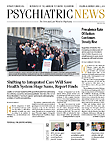The U.S. House of Representatives is moving forward on legislation designed to expand access to mental health care and improve the coordination of federal mental health programs, said Rep. Tim Murphy (R-Pa.) at a Washington D.C., forum March 28.
Current federal mental health policies are “wasteful and misdirected” and do not focus enough money on evidence-based treatment, said Murphy, lead author of the bill, HR 3717. He spoke on a panel at the American Enterprise Institute that included APA President Jeffrey Lieberman, M.D., psychiatrist E. Fuller Torrey, M.D., and former member of Congress Patrick Kennedy, who is a senior advisor to APA.
“This is a time that can be a turning point,” said Lieberman. “Rep. Murphy, along with other individuals in Congress, has stepped forward to assume an important, meaningful role.”
Among the bill’s provisions is the creation of a new assistant secretary position in the Department of Health and Human Services to coordinate activities within the agency on prevention and treatment of mental health and substance abuse.
Other parts of the bill would increase funding for crisis-intervention team training for police officers and firefighters, prohibit exceptions on coverage of some psychiatric drugs under Medicare Part D, mandate that state Medicaid plans allow for same-day billing, expand training grants for telepsychiatry, and change provisions of the Health Insurance Portability and Accountability Act to permit disclosure of information about individuals with mental illness to caregivers or immediate family members under certain circumstances.
“We have to provide access to information without compromising confidentiality,” said Murphy, who holds a Ph.D. in clinical psychology.
The bill also calls for $40 million a year for the National Institute of Mental Health to fund the Brain Research through Advancing Innovative Neurotechnologies (BRAIN) Initiative (Psychiatric News, October 16, 2013) or other “research on the determinants of self- and other-directed violence in mental illness, including studies directed at reducing the risk of self-harm, suicide, and interpersonal violence.”
The bill would also encourage states to adopt a “need-for-treatment” standard for assisted outpatient treatment (AOT), he said, adding that the current legal standard requiring “dangerousness to self or others” to permit involuntary evaluation and treatment was a bar set too high.
“We don’t wait until a patient has a stroke or stage 4 cancer before we intervene, but with psychiatric conditions we must wait until they are very far gone,” said Murphy.
Torrey, a longtime advocate of AOT, agreed. “Perhaps only 1 percent of people with serious mental illnesses need to be in AOT, but they really need it.”
APA leaders are encouraged by Murphy’s efforts and are working with him and other mental health organizations to further refine the legislation in the hope that the entire mental health community can support the bill. While the bill has many positive provisions to enhance treatment for patients with severe mental illness, there remains concern over funding cuts to SAMHSA programs.
“It is APA’s hope that lawmakers in both parties, in collaboration with the mental health advocacy community, can move forward with bipartisan comprehensive mental health legislation that significantly and positively reforms our broken public health delivery system,” said APA CEO and Medical Director Saul Levin, M.D., M.P.A., in a statement provided to a House subcommittee hearing.
Advances in the science of the brain, increased public awareness about mental health issues, and legislative initiatives are coming together now, said Lieberman. “So we have a real historic opportunity, and we need to take full advantage of it,” he said. “We need a public-health initiative for mental health care that moves out of clinical settings into the community, whether it’s in primary care, education, the workplace, or faith-based organizations.”
Murphy’s bill has been introduced and referred to multiple House committees with purview over issues covered in the bill. It has received a hearing in the House Energy and Commerce Health Subcommittee.
During APA’s 2014 annual meeting, Murphy will address the APA Assembly about his legislation and his vision to improve the lives of people with mental illness. He is scheduled to speak on Sunday, May 4, from 9:15 a.m. to 9:45 a.m. at the New York Marriott Marquis in Westside Ballroom 1-4, Fifth Floor. ■
APA’s letter on Murphy’s bill is posted
here. The bill, HR 3717, is can be accessed
here.

